Power-political rivalries and an intense arms race have strained international relations since the beginning of the 20th century. After the assassination of the heir to the Austro-Hungarian throne in Sarajevo on June 28, 1914, all diplomatic efforts to resolve the conflict failed due to the irreconcilable striving for power by the great European powers. From August 1914, the Central Powers Germany and Austria-Hungary were at war with the allied Entente states of France, Great Britain and Russia. The war not only prevailed on the battlefields in Europe, the colonies in Africa, in the Middle East and on the high seas, but also for the first time on the "home front". Many Germans soon suffered from hunger here, were disappointed by the sluggish course of the war and shocked by the mass killings on the western front. The First World War ended in November 1918 with the military defeat of Germany and its ally Austria-Hungary. The number of dead and injured up to 1918 was immense: Around nine million soldiers and more than six million civilians died worldwide.
The Shock of the new war
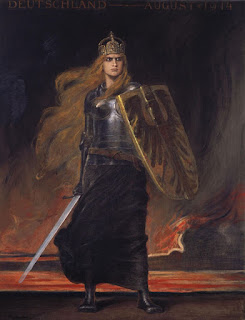 |
| Friedrich August von Kaulbach: "Germania", Germany 1914 |
Newspapers and patriotic publications fueled a certainty of victory that went beyond all reasonableness - and from the very first day of hostilities they wrote of a "world war": of a confrontation whose effects would change the face of the world. The war on two fronts that Germany had to wage had become inevitable in view of the opposing alliances. In the east, German troops managed to advance deep into Russia and keep the front lines away from home. In the West, the German advance by September 1914 had bogged down and turned into a deadly trench warfare. After only a few months, the war in France and Belgium no longer corresponded in any way to the concept of a short and decisive battle at arms or even to the traditional soldierly ideals of a heroic fight man against man. This war brought with it a hitherto largely unknown technical "modernization" and totalization. Through material battles and the use of modern war equipment, an unprecedented killing began on the western front. The increase in violence in the course of the war leading to industrialized mass death, the brutalization of combat and the invention of new techniques of killing and injuring using poison gas, flamethrowers or air warfare not only shaped subsequent wars, but also the thinking of almost every soldier.
Death and trauma
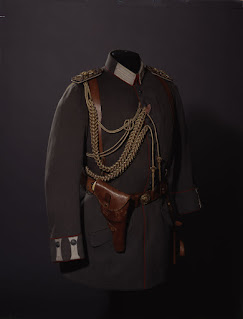 |
| Last field uniform of Kaiser Wilhelm II. |
Hunger and the end of the war
Mass death and suffering - at the front and at home - was the basic experience of the First World War. In Germany, supply bottlenecks, rising food prices and last but not least the feeling of an unfair distribution led to the first hunger riots as early as 1915. The national community, which had not only been propagated since the summer of 1914 but also felt as such by the majority of the German population, began to crack in the face of obvious social inequality. The continuation of the fighting with no prospect of success in the near future and the extent of the losses becoming increasingly clear to the civilian population led to a general deep war fatigue from 1916 onwards, together with the growing social misery. However, the German Reich received a boost when, on March 3, 1918, it pushed through an advantageous peace treaty with Russia. On the western front, however, the prospects of victory had deteriorated dramatically since the United States entered the war in April 1917. After the failure of major offensives in the summer of 1918, the fighting power of the German army was completely exhausted. They still held their positions against superior opponents, but Germany was no longer able to win the war. On September 29, 1918, in a militarily hopeless situation, the Supreme Army Command (OHL) demanded that the political leadership negotiate an armistice, which was signed on November 11, 1918.
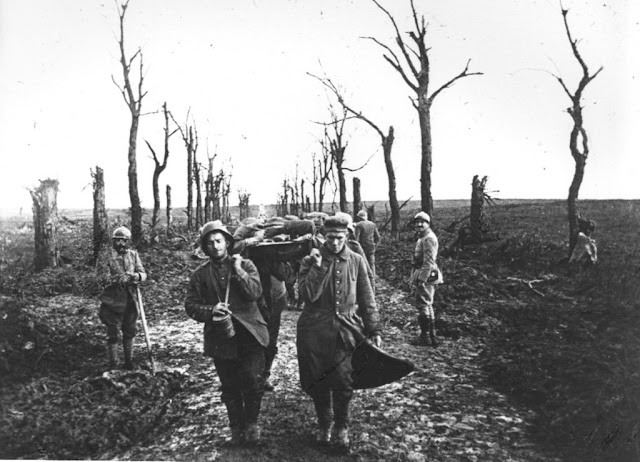 |
| Deutsche Gefangene |
At the end of the First World War in 1918, the state of affairs in Europe and the Middle East had changed significantly. The monarchies in Germany, Austria-Hungary and Russia were abolished and the Ottoman Empire fell apart. New nation states emerged. Nationality problems and military conflicts continued to prevail in Europe and the Middle East for a long time. The suffering of the war erupted in revolutionary upheavals in many European countries. In the German Reich, too, hunger and deprivation, together with disappointment at the military defeat, strengthened democratic and socialist aspirations. On November 9, 1918, the republic was proclaimed. Kaiser Wilhelm II had to renounce his throne. The armistice was signed on November 11th. On the same day the guns fell silent.
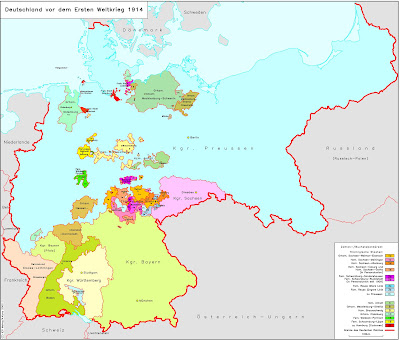 | |
| The German Reich before 1914 |
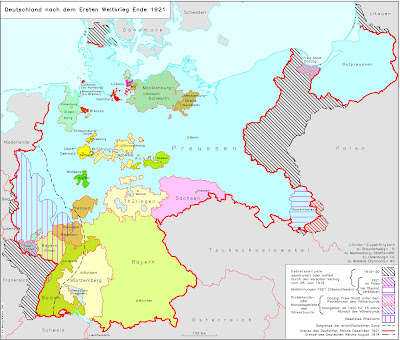 |
| The German Reich 1921 |